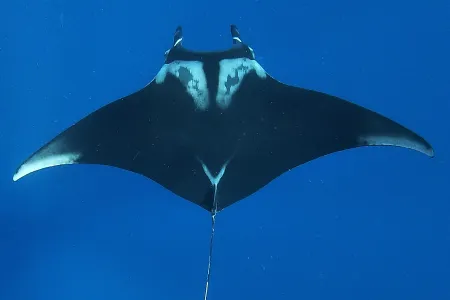News Article
Sharks and rays facing unprecedented extinction risk
A Charles Darwin University shark and ray expert has joined a team from across the globe to inform a ground-breaking new study finding oceanic sharks and rays face unprecedented extinction risk from overfishing.
The research published in the eminent journal Nature documents an alarming, ongoing, global decline of oceanic shark and ray populations over the past 50 years, primarily due to overfishing.
CDU Research Institute for the Environment and Livelihoods Dr Peter Kyne is an internationally recognised shark and ray expert and the International Union for Conservation of Nature (IUCN) Species Survival Commission Shark Specialist Group’s Red List Authority Co-ordinator.
Dr Kyne oversaw the Red List assessment process and led the assessments for five of the 31 species included in the paper.
Overall, the team found a 71% decline in global abundance since 1970, a period that saw a doubling of fishing pressure and a tripling of shark and ray catches. Three-quarters (77%) of oceanic shark and ray species now qualify as threatened with extinction under the Red List criteria of the IUCN.
Some formerly abundant, wide-ranging shark species have declined so steeply that they now fall into the two highest threat categories on the IUCN Red List, including the commercially valuable Shortfin Mako Shark, which was recently classified as Endangered and the iconic Oceanic Whitetip Shark, which is now considered Critically Endangered.
Dr Kyne said that the research highlighted an alarming world-wide trend.
“Shark and ray fins and meat are highly valued in some countries,” Dr Kyne said. “Sharks and rays also have a naturally low reproductive rate that leaves them susceptible to overfishing.
“A global effort is required to address overexploitation and put an end to unsustainable international trade in their parts, and to ensure effective protection for threatened species.”
Dr Kyne said that Northern Australia was home to several endangered sharks and rays and current research at CDU played a critical role in providing information and understanding to support marine biodiversity management and conservation.
“The more we understand about these threatened and migratory species, the better decisions we can make about marine environmental management and ensure that the biodiversity of our coastal waters are maintained,” Dr Kyne said.
“In some cases, Northern Australia is becoming the last stronghold of some shark and ray species, such as Rhino Rays.”
The Global Shark Trends Project is a collaboration of the IUCN Species Survival Commission Shark Specialist Group.
Related Articles

Nanoplastics hindering cognitive abilities of fish, international research shows
Nanoplastic exposure can impair the cognitive abilities of fish and could lead to significant impacts on marine species’ ability to survive, according to a new international study.
Read more about Nanoplastics hindering cognitive abilities of fish, international research shows
Eradication would cost billions: NT’s lessons for Pilbara’s cane toad management
Cane toads are predicted to invade Western Australia’s Pilbara region by 2041 if left unchecked, but the Northern Territory’s population of the pests hold key lessons that could save billions in eradication costs.
Read more about Eradication would cost billions: NT’s lessons for Pilbara’s cane toad management
New project to grow Indigenous aquaculture on one of Australia’s largest islands
An Australian island’s efforts to improve food security and transition into a blue economy will be bolstered by a new project to propagate a nutritious and increasingly popular fish.
Read more about New project to grow Indigenous aquaculture on one of Australia’s largest islands
